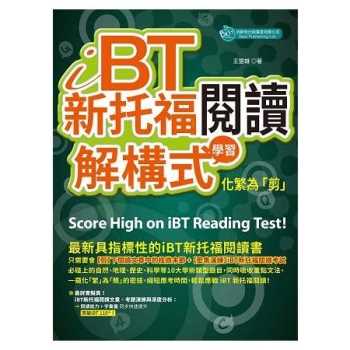1-5 Isaac Newton’s Laws of Motion (1) 牛頓運動定律(1)
閱讀原文:試著用3分鐘的時間文章念完,記得先把中文遮上,並翻頁看看題目問什麼。計時開始!
Isaac Newton’s Laws of Motion (1)
Sir Isaac Newton possessed one of the keenest scientific intellects of his time. In spite of his brilliance, he was a humble person who always tried to depreciate his contributions to science, preferring instead to honor the scientists who had preceded him. He once remarked, "If I have seen further [than others], it is by standing upon the shoulders of Giants."
Newton is famous primarily for his laws describing motion. When the plague forced Cambridge University to shut down temporarily, Newton left the university and stayed for a time at his mother’s farm. It was during this period that Newton formulated the three laws of motion, which reduce nearly all the motion we observe to concepts that are relatively simple, considering the complexities of physics. While there is no evidence to support the popular, but no doubt apocryphal, story that Newton discovered gravity when an apple fell on his head as he sat under a tree, it seems certain that observing falling objects caused Newton to think about the forces at work in the universe.
牛頓運動定律(1)
牛頓擁有他那時代最犀利的科學天分。儘管成就斐然,他這人卻很謙虛,總是貶低自己在科學上的貢獻,反而喜歡彰顯比他出道更早的科學家。他曾經說過:「如果說我看得[比別人]更遠,那是因為我站在巨人的肩膀上。」
牛頓主要以闡述運動的定律聞名於世。當劍橋大學因黑死病不得不暫時停課時,牛頓離開大學在媽媽農場裡待了一段時間。就是在這期間,牛頓構想出運動三大定律,將我們所觀察到的所有運動簡化為相當簡單的概念,沒有物理學慣有的繁複。有個虛構卻廣為人知的故事說,牛頓坐在樹下時,一顆蘋果砸到他的頭,因而發現地心引力。雖然沒有證據足以為證,但是似乎可以肯定的是觀察掉落的物體讓牛頓想到宇宙中運作的力量。
考題演練及解析
According to this passage, which is NOT true of Sir Isaac Newton?
(A) Doubt has been cast on the authenticity of the story that Newton’s three laws of motion owed their inspiration to a falling apple.
(B)Newton came up with the laws of motion during a break in his studies at Cambridge University
(C) Though one of the best physicists of his generation, Newton was so modest as to credit his scientific achievements to the work of scientists senior to him.
(D) Keeping a careful watch on something dropping motivated Newton to develop his theory of gravity.
根據本文,以下關於牛頓的敘述哪一個是不對的?
(A) 牛頓運動三大定律的靈感源自一顆掉下來的蘋果,這個故事的真實性受到質疑。
(B) 在劍橋大學研究停課期間,牛頓提出了運動定律。
(C) 雖然是當代最傑出的物理學家,牛頓卻謙虛到把自己的科學成就歸功於前輩的努力。
(D) 仔細觀察掉下來的東西讓牛頓靈光一閃,開展出了地心引力學說。解析
答案:(A)
1. 要是沒看清楚,會誤以為選項(A)是正確敘述,其實答案不是 (A) ,因為那個蘋果砸到頭的傳說是說牛頓因此想到「地心引力」,而不是「運動三大定律」。雖然本文主題確實是運動三大定律,但是不代表牛頓其它成就都不會提到,何況地心引力跟運動三大定律也風馬牛不相及。
2. (B) 選項是正確陳述,因為根據第二段前兩句陳述,由於瘟疫肆虐導致劍橋大學不得不停課,牛頓正是住在母親農場裡,那時構想的運動定律成為牛頓最重要的學說。
3. 第一段整段都是在談牛頓多麼謙虛,就算不懂humble這個字,從牛頓說If I have seen further, it is by standing upon the shoulders of Giants這句話,也可以推測牛頓這個人有不居功的雅量,因此 (C) 所述完全正確。
4. (D) 選項跟整篇文章最後那一行完全吻合。也就是說,蘋果掉在牛頓頭上這說法固然不可信,但是觀察掉落的物體給牛頓地心引力學說臨門一腳這種說法倒是比較可取。
深度應用分析:對付閱讀就是要化「繁」為「簡」。先刪去( )、[]內的文字,找出主要的主詞和動詞!
①. While {there is no evidence to support the popular(, but no doubt apocryphal,) story [that Newton discovered gravity(when an apple fell on his head as he sat under a tree)]}, {it seems certain that (observing falling objects caused Newton to think about the forces at work in the universe.)}
解析
1. 連接詞while連接一個廣為流傳的謠傳,和一個似乎比較可信的說法。該注意的是…when an apple fell on his head as he sat... 這句話的when並不是連接詞「當」,更不是疑問詞「什麼時候」,而是關係副詞,意即「在…的時候」;同樣這子句後面那個的as意思才是「當」。
2. when、while、as字義都是「當」,部分場合用法又雷同,很容易造成混淆。假如主要子句表示一個短暫性動作,附屬子句表示一個持續性動作時,三者都可用,本句的as就是這種情況。不過因為前面已經出現過while、when,為避免讀者混淆,所以用as。只有while可以表示對比並列,本句開頭第一個字while就是這種情況。假如主要子句和附屬子句所表示的動作並非同時發生,而是有先後順序,一般都用when,例如:When the clock strikes twelve, the girl must go home. (鐘敲12下時,這女孩就必須回家。)
②. It was during this period that Newton formulated the three laws of motion, [which reduce nearly all the motion (we observe) to concepts (that are relatively simple, considering the complexities of physics.)]
解析
1. 這是it is …that…強調句型,把during this period套進it is和that當中意味這是很重要的訊息,提醒讀者這段期間就是牛頓的運動三大定律誕生的搖籃。關係代名詞which引導的子句裡還有兩個關係子句:一句是we observe,前面有which,但是因為在附屬子句是受詞,所以省略掉了;另一句concepts後面的that子句,因為關係代名詞that在附屬子句是主詞,所以不能省略,但是可以改成which。
本文motion出現很多次,其實英文很多mo開頭的字,都跟move有關,光大家最熟悉的就有movie「電影」、motor「馬達」、mobile「行動的」,其它親戚像motive「動機」、motif「動機」、momentum「動力」,還有遠親migrate「遷移」,結構複雜一點的是commotion = com(together、thoroughly) + mot + ion(名詞字尾) =「騷動」。
閱讀原文:試著用3分鐘的時間文章念完,記得先把中文遮上,並翻頁看看題目問什麼。計時開始!
Isaac Newton’s Laws of Motion (1)
Sir Isaac Newton possessed one of the keenest scientific intellects of his time. In spite of his brilliance, he was a humble person who always tried to depreciate his contributions to science, preferring instead to honor the scientists who had preceded him. He once remarked, "If I have seen further [than others], it is by standing upon the shoulders of Giants."
Newton is famous primarily for his laws describing motion. When the plague forced Cambridge University to shut down temporarily, Newton left the university and stayed for a time at his mother’s farm. It was during this period that Newton formulated the three laws of motion, which reduce nearly all the motion we observe to concepts that are relatively simple, considering the complexities of physics. While there is no evidence to support the popular, but no doubt apocryphal, story that Newton discovered gravity when an apple fell on his head as he sat under a tree, it seems certain that observing falling objects caused Newton to think about the forces at work in the universe.
牛頓運動定律(1)
牛頓擁有他那時代最犀利的科學天分。儘管成就斐然,他這人卻很謙虛,總是貶低自己在科學上的貢獻,反而喜歡彰顯比他出道更早的科學家。他曾經說過:「如果說我看得[比別人]更遠,那是因為我站在巨人的肩膀上。」
牛頓主要以闡述運動的定律聞名於世。當劍橋大學因黑死病不得不暫時停課時,牛頓離開大學在媽媽農場裡待了一段時間。就是在這期間,牛頓構想出運動三大定律,將我們所觀察到的所有運動簡化為相當簡單的概念,沒有物理學慣有的繁複。有個虛構卻廣為人知的故事說,牛頓坐在樹下時,一顆蘋果砸到他的頭,因而發現地心引力。雖然沒有證據足以為證,但是似乎可以肯定的是觀察掉落的物體讓牛頓想到宇宙中運作的力量。
考題演練及解析
According to this passage, which is NOT true of Sir Isaac Newton?
(A) Doubt has been cast on the authenticity of the story that Newton’s three laws of motion owed their inspiration to a falling apple.
(B)Newton came up with the laws of motion during a break in his studies at Cambridge University
(C) Though one of the best physicists of his generation, Newton was so modest as to credit his scientific achievements to the work of scientists senior to him.
(D) Keeping a careful watch on something dropping motivated Newton to develop his theory of gravity.
根據本文,以下關於牛頓的敘述哪一個是不對的?
(A) 牛頓運動三大定律的靈感源自一顆掉下來的蘋果,這個故事的真實性受到質疑。
(B) 在劍橋大學研究停課期間,牛頓提出了運動定律。
(C) 雖然是當代最傑出的物理學家,牛頓卻謙虛到把自己的科學成就歸功於前輩的努力。
(D) 仔細觀察掉下來的東西讓牛頓靈光一閃,開展出了地心引力學說。解析
答案:(A)
1. 要是沒看清楚,會誤以為選項(A)是正確敘述,其實答案不是 (A) ,因為那個蘋果砸到頭的傳說是說牛頓因此想到「地心引力」,而不是「運動三大定律」。雖然本文主題確實是運動三大定律,但是不代表牛頓其它成就都不會提到,何況地心引力跟運動三大定律也風馬牛不相及。
2. (B) 選項是正確陳述,因為根據第二段前兩句陳述,由於瘟疫肆虐導致劍橋大學不得不停課,牛頓正是住在母親農場裡,那時構想的運動定律成為牛頓最重要的學說。
3. 第一段整段都是在談牛頓多麼謙虛,就算不懂humble這個字,從牛頓說If I have seen further, it is by standing upon the shoulders of Giants這句話,也可以推測牛頓這個人有不居功的雅量,因此 (C) 所述完全正確。
4. (D) 選項跟整篇文章最後那一行完全吻合。也就是說,蘋果掉在牛頓頭上這說法固然不可信,但是觀察掉落的物體給牛頓地心引力學說臨門一腳這種說法倒是比較可取。
深度應用分析:對付閱讀就是要化「繁」為「簡」。先刪去( )、[]內的文字,找出主要的主詞和動詞!
①. While {there is no evidence to support the popular(, but no doubt apocryphal,) story [that Newton discovered gravity(when an apple fell on his head as he sat under a tree)]}, {it seems certain that (observing falling objects caused Newton to think about the forces at work in the universe.)}
解析
1. 連接詞while連接一個廣為流傳的謠傳,和一個似乎比較可信的說法。該注意的是…when an apple fell on his head as he sat... 這句話的when並不是連接詞「當」,更不是疑問詞「什麼時候」,而是關係副詞,意即「在…的時候」;同樣這子句後面那個的as意思才是「當」。
2. when、while、as字義都是「當」,部分場合用法又雷同,很容易造成混淆。假如主要子句表示一個短暫性動作,附屬子句表示一個持續性動作時,三者都可用,本句的as就是這種情況。不過因為前面已經出現過while、when,為避免讀者混淆,所以用as。只有while可以表示對比並列,本句開頭第一個字while就是這種情況。假如主要子句和附屬子句所表示的動作並非同時發生,而是有先後順序,一般都用when,例如:When the clock strikes twelve, the girl must go home. (鐘敲12下時,這女孩就必須回家。)
②. It was during this period that Newton formulated the three laws of motion, [which reduce nearly all the motion (we observe) to concepts (that are relatively simple, considering the complexities of physics.)]
解析
1. 這是it is …that…強調句型,把during this period套進it is和that當中意味這是很重要的訊息,提醒讀者這段期間就是牛頓的運動三大定律誕生的搖籃。關係代名詞which引導的子句裡還有兩個關係子句:一句是we observe,前面有which,但是因為在附屬子句是受詞,所以省略掉了;另一句concepts後面的that子句,因為關係代名詞that在附屬子句是主詞,所以不能省略,但是可以改成which。
本文motion出現很多次,其實英文很多mo開頭的字,都跟move有關,光大家最熟悉的就有movie「電影」、motor「馬達」、mobile「行動的」,其它親戚像motive「動機」、motif「動機」、momentum「動力」,還有遠親migrate「遷移」,結構複雜一點的是commotion = com(together、thoroughly) + mot + ion(名詞字尾) =「騷動」。


